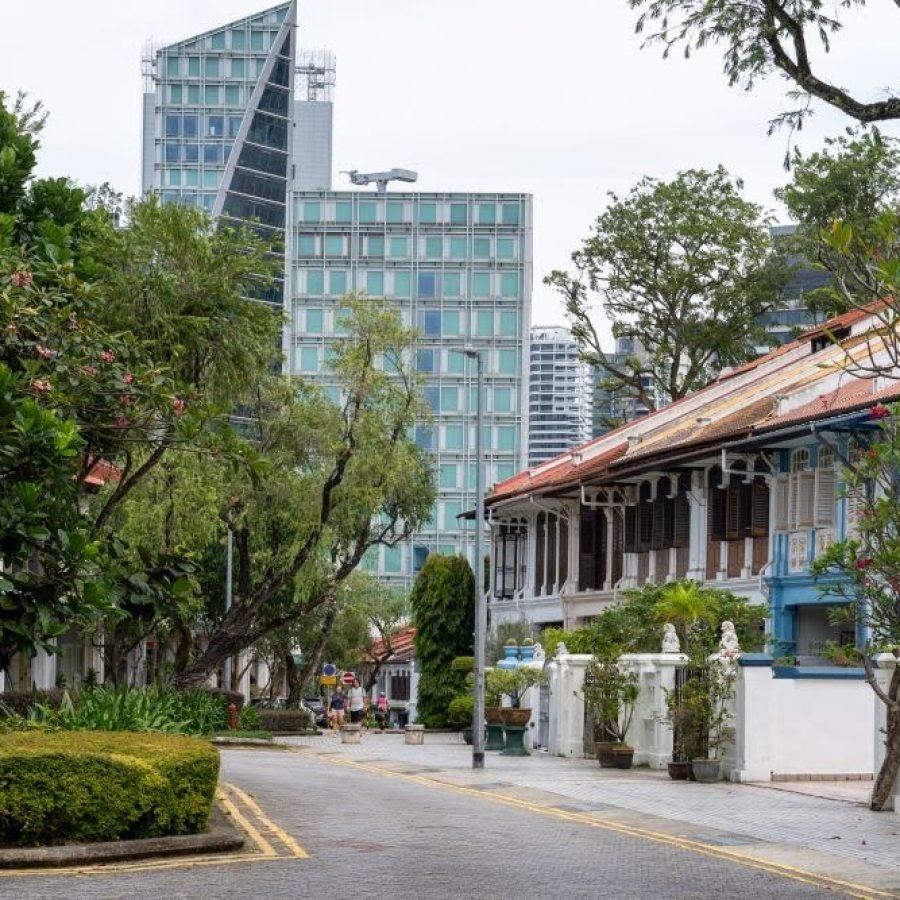Guide to Private House Loans in Singapore

What is a Private House Loan?
A private house loan is a financing option designed specifically for the purchase of private residential properties in Singapore.
Unlike loans for public housing, such as HDB flats, private home loans cater to properties that are not government-subsidised, including condominiums, landed properties, and private apartments. These loans are typically offered by banks and financial institutions, and they come with varying terms, interest rates, and conditions tailored to meet the needs of private property buyers.
In Singapore, private housing loans play a crucial role in enabling individuals to purchase high-value properties. These loans can cover up to a significant portion, typically up to 75%, of the property’s purchase price, depending on factors such as the borrower’s financial standing, the property’s valuation, and prevailing market conditions. By leveraging a private housing loan, buyers can spread the cost of their property over an extended period, making homeownership more accessible and financially manageable.
The structure of a private property loan typically involves an initial down payment followed by monthly instalments that cover both the principal and interest. Borrowers have the flexibility to choose between different interest rate packages, such as fixed-rate and floating-rate loans, depending on their financial strategies and market outlook. Additionally, these loans may offer various benefits and features, such as refinancing options, prepayment privileges, and promotional rates.

Private House Loan Application and Approval Process
The process for getting a private housing loan begins with the loan application, where the borrower submits detailed financial information, including income statements, credit history, and details of the property to be purchased. The lender then assesses the borrower’s eligibility based on criteria such as income stability, credit score, and the property’s valuation. Once approved, the loan amount is disbursed according to the agreed terms.
Private House Loan Interest Rates and Repayment
Private home loans can come with either fixed or floating interest rates:
- Fixed Rate Package: A fixed rate package offers an interest rate that remains constant throughout the loan tenure or for a specified period, usually 1 to 5 years. This stability allows borrowers to predict their monthly payments accurately, making it easier to budget and plan for the future. Fixed-rate loans are ideal for those who prefer certainty and want to avoid the risk of fluctuating interest rates.
- Variable (Floating) Rate Package: A variable rate package, also known as a floating rate loan, has interest rates that can change based on market conditions. These rates are typically pegged to benchmark rates like the Singapore Overnight Rate Average (SORA) or Fixed Deposit-Linked Rates (FD-linked Rates). While floating rates can initially be lower than fixed rates, they carry the risk of increasing over time. This type of loan suits borrowers who expect interest rates to fall or remain stable.
Private House Loan Down Payment and Monthly Instalments
The borrower is required to make a down payment when applying for the private property loan, usually amounting to 25% of the property’s purchase price. This down payment will also be further structured to provide borrowers with flexibility:
- 1% Cash to make an offer, 4% Cash to exercise the Option
- 20% Cash/CPF to be paid upon completion
The remaining amount is financed through the loan, repaid in monthly instalments over the loan tenure, which can range from 5 to 30 years. These instalments include both the principal and interest components, and the exact amount payable per month varies based on the loan terms and interest rate structure.
Use of CPF Funds for Private House Loan
Unique to Singapore, borrowers of private home loans can use their Central Provident Fund (CPF) savings to pay for the down payment (provided they secure a 75% loan from their bank) and monthly instalments. This provides additional flexibility and helps reduce the out-of-pocket expenses required for property purchase, offering more options for Singaporeans seeking to own their own private property.
Who is Eligible for Private Housing Loans in Singapore?
Eligibility for a private housing loan in Singapore depends on several factors, including financial standing, property type, and compliance with regulatory requirements. Other things to have in mind when applying for a private housing loan include:
Maximum Loan-to-Value (LTV) Ratio and Tenure
The Maximum Loan-to-Value (LTV) ratio for private property loans typically ranges to 75% of the property’s value. This means that the bank can lend up to this percentage of the property valuation or purchase price, whichever is lower. The LTV ratio will vary depending on the borrower’s age and loan tenure; for example, younger borrowers may qualify for higher LTV ratios and longer loan tenures, whereas older borrowers might face stricter limits.
Use of CPF Funds
Borrowers can use their CPF Ordinary Account (OA) savings to finance part of the purchase of private properties. This includes paying for the down payment, monthly instalments, and other related costs. Using CPF funds can help reduce the immediate cash outlay required for the property purchase. However, it’s recommended to consult with your bank’s loan officer on how this may affect your loan amount.
Special Eligibility Requirements for Those Without Income
For borrowers without a regular income, such as retirees or those with alternative income sources, eligibility for private home loans can be more challenging. However, lenders may consider factors like existing assets, financial history, and potential for future income to determine loan approval.

Tips on Getting Your Private Housing Loan Approved
Securing approval for a private housing loan in Singapore involves meeting several key criteria and demonstrating financial responsibility. Here are some tips to improve your chances:
Your Credit Score
A good credit score is crucial for approval of your private home loan. Lenders use your credit score to assess your creditworthiness and determine the risk associated with lending to you. An excellent credit score indicates a history of responsible borrowing and timely repayments, making you a lower risk to lenders.
To improve your credit score, ensure your credit report is accurate and free from errors. Pay off any outstanding debts and avoid taking on new debt before applying for the loan. Consistently making on-time payments and reducing your credit card balances can also positively impact your score. Additionally, avoid closing old credit accounts, as the length of your credit history contributes to your overall score.
If your credit score is low, consider taking steps to improve it several months before applying for a loan to increase your chances of approval.
Your Income and Employment Stability
Lenders prefer borrowers with stable and verifiable income. A consistent employment history with a steady income stream can thus significantly increase your chances of loan approval.
For salaried employees, providing recent pay slips, employment letters, and CPF contributions can demonstrate income stability. Self-employed individuals should provide comprehensive documentation of their earnings, including their NOA and CPF contributions.
Private home lenders may also consider your income's source, with a preference for more stable, salaried positions over variable or commission-based incomes. Demonstrating job stability by showing a long tenure with your current employer can further bolster your application.
If you have recently changed jobs, it might be beneficial to wait until you have a longer employment history (1 to 3 months) with your new employer before applying for a private property loan in Singapore.
Your Age
Age can impact the loan tenure and the amount you can borrow.
Younger borrowers may qualify for longer loan tenures, which can reduce monthly payments and make the loan more affordable. This extended tenure also means you can potentially borrow a larger amount. Older borrowers, however, might face shorter tenures, which could increase monthly repayment amounts due to the shorter period over which the loan must be repaid.
Lenders typically prefer that the loan be fully repaid before the borrower reaches retirement age, usually between 65 to 75 years old. Therefore, if you are older, you may need to demonstrate additional financial stability or provide a larger down payment to secure approval. It's also important to consider your overall retirement plans and income sources when selecting your loan tenure, ensuring you can comfortably manage repayments post-retirement.
Your Property Location
The location of the property may influence the loan approval process. Certain areas in Singapore, such as Sentosa and Geylang, may face restrictions regarding property codes. As such, banks may not be as keen to finance these areas.When selecting a property, consider factors such as proximity to transportation hubs, schools, shopping centres, and other amenities. Conduct thorough research on the property's location and market trends to ensure it aligns with your investment goals and enhances your loan approval prospects.
Loan-to-Value (LTV) Ratio
The Loan-to-Value (LTV) ratio determines the maximum loan amount relative to the property’s value. A higher LTV ratio can reduce your down payment but may come with stricter eligibility requirements. In Singapore, the LTV ratio for a first home can go up to 75%, meaning you can borrow up to 75% of the property's value. For subsequent properties, the LTV ratio typically decreases.
To calculate the LTV ratio, divide the loan amount by the property value and multiply by 100. A lower LTV ratio requires a larger down payment but can improve your loan approval chances. Lenders use the LTV ratio to assess the risk involved; a lower LTV ratio indicates lower risk. Ensuring your LTV ratio aligns with the lender’s criteria is crucial for loan approval and can also influence the overall cost of borrowing.
Total Debt Servicing Ratio (TDSR)
The Total Debt Servicing Ratio (TDSR) limits the percentage of your gross monthly income that can be used to service all debt obligations, including property loans. In Singapore, the TDSR is capped at 55%. Ensuring your TDSR is within the allowable limits is critical for loan approval.
To calculate your TDSR, sum up all monthly debt obligations, including the proposed mortgage payment, and divide by your gross monthly income, then multiply by 100 to get the percentage. A high TDSR indicates over-leveraging, which can hinder loan approval. To manage your TDSR, consider paying off existing debts, consolidating high-interest debts into lower-interest loans, or increasing your income. Demonstrating a low TDSR reassures lenders of your ability to manage debt responsibly and reduces the perceived risk, improving your chances of securing a loan.
Property Valuation and Eligibility
The property’s valuation affects the loan amount you can borrow. An accurate property valuation ensures the loan amount aligns with the property's market value, protecting both the borrower and lender. Lenders typically require a professional valuation by an accredited valuer to determine the property’s worth. This valuation considers factors such as the property's location, size, condition, and recent sales of similar properties in the area.
Additionally, the property should comply with all government regulations and zoning laws. Understanding the property's eligibility and securing an accurate valuation can streamline the loan approval process and ensure you borrow an appropriate amount.
Loan Type and Interest Rate
Choosing the loan type and interest rate package that best fits your financial situation and risk tolerance is crucial. Consider your financial goals, market outlook, and comfort with risk when selecting between fixed and floating rates. Additionally, look for promotional offers and compare different lenders to find the most competitive rates. Understanding the pros and cons of each loan type helps you make an informed decision that aligns with your long-term financial plans.
Loan Repayment Tenure
Selecting a repayment tenure that balances monthly affordability with total interest costs is key. Longer tenures reduce monthly payments, making the loan more manageable on a month-to-month basis. However, they increase the total interest paid over the life of the loan. Shorter tenures result in higher monthly payments but reduce the overall interest cost, helping you save money in the long run.
When choosing your loan tenure, consider your monthly cash flow, income stability, and long-term financial goals. It’s also important to account for any changes in income or expenses that might occur over the loan period. Striking the right balance between tenure and repayment amounts ensures that your loan is both affordable and cost-effective.
Size of Down Payment
A larger down payment can improve your loan approval chances by reducing the lender’s risk. It demonstrates your financial commitment to the property purchase and can also lower the loan-to-value (LTV) ratio. By reducing the amount you need to borrow, a larger down payment can help you secure better loan terms and lower interest rates. It also decreases your monthly repayment amounts, making the loan more manageable.
Saving for a larger down payment requires careful financial planning and discipline. Consider setting aside a portion of your income regularly and exploring additional income sources to build your savings. A substantial down payment not only strengthens your loan application but also enhances your overall financial stability.
Remaining Lease
For properties with shorter remaining leases, lenders may impose stricter terms or offer lower LTV ratios. The remaining lease tenure must align with the loan tenure, ensuring that the property’s lease does not expire before the loan is fully repaid. Properties with longer remaining leases are viewed as lower risk, making it easier to secure favourable loan terms.
Before purchasing a property, check the lease tenure and ensure it meets the lender’s criteria. Properties with less than 30 years remaining on the lease may face significant restrictions, and securing a loan can be more challenging. Understanding the implications of the remaining lease on your loan application is essential for planning your property purchase and managing your finances effectively.
What Our Customers Say
Our clients consistently commend The Loan Connection for providing attentive, personalised advice on private house loans, HDB home loan refinancing, HDB bridging loans, and other mortgage-related issues in Singapore. Read their reviews!
How to Get Started with TLC for Your Private Home Loan
Getting started with your private home loan in Singapore through The Loan Connection is a straightforward process designed to ensure a smooth and successful experience:
Consultation and Assessment
Begin with a consultation where our experienced mortgage advisors assess your financial situation, property goals, and loan requirements. This initial assessment helps us understand your needs and tailor our advice accordingly.
Preliminary In-Principle Approval (IPA) Process
Next, we assist you in securing a Preliminary In-Principle Approval (IPA) from a bank. This step involves submitting essential financial documents and information to get an estimate of the loan amount you qualify for. An IPA strengthens your position when negotiating with property sellers and ensures you have a clear understanding of your borrowing capacity.
Bank-Indicated Property Valuations
We provide bank-indicated property valuations to help you understand the market value of your desired property. This valuation is crucial for determining the loan amount you can secure and ensuring the property’s worth aligns with your financial plans.
Why Choose TLC as Your Private Home Lenders?
Choosing The Loan Connection for your private home loan needs offers several distinct advantages:
Customised Mortgage Solutions: We offer tailored mortgage solutions designed to meet your specific financial needs and property goals. Our advisors work closely with you to identify the best loan packages and interest rates available.
Professional Mortgage Advice: Our team of experienced mortgage advisors provides professional advice and guidance throughout the loan application process. We help you navigate the complexities of private housing loans, ensuring you make informed decisions that align with your financial objectives.
Hassle-Free Mortgage Review: At The Loan Connection, we offer a hassle-free mortgage review service to help you evaluate your current loan and explore better options. Whether you are considering refinancing or need advice on managing your mortgage, our team is here to assist you every step of the way.

Frequently Asked Questions About Private House Loans
The TDSR affects your borrowing capacity by setting a cap on the total amount of debt you can service relative to your income. A lower TDSR means you can borrow more, while a higher TDSR limits your borrowing capacity. It also impacts your monthly repayments, as private home lenders will ensure that your total debt obligations do not exceed a certain percentage of your income.
The maximum loan tenure for private property home loans in Singapore is typically 30 years. A longer loan tenure can reduce your monthly repayments but will increase the total interest paid over the life of the loan. Conversely, a shorter tenure increases monthly repayments but reduces the overall interest costs.
For new private properties under construction (BUC), loans are typically disbursed progressively based on the construction milestones. These loans may offer interest-only payment periods during construction. Completed resale properties, on the other hand, involve immediate full disbursement of the loan amount, and regular principal and interest repayments start immediately. Find out more in our guide to building under construction (BUC) loans in Singapore.
The documents required for a private property home loan application typically include proof of identity (NRIC or passport), income statements (pay slips, NOA), bank statements, CPF statements, property Option to Purchase, and/or property Sales and Purchase Agreement. Additional documents may be required depending on the lender's criteria.